The Nespresso business model is known as the razor-razorblade model. The razor-razorblade model, also known as the “razor and blades” model, is a pricing strategy where a company sells a product (the “razor”) at a low or even subsidized price and then profits from the ongoing sales of complementary consumable products (the “blades”).
In the case of Nespresso, the coffee machines (the “razor”) are sold at a relatively affordable price, making them accessible to a broader customer base. However, the proprietary coffee capsules (the “blades”) are sold at a higher price per unit, allowing Nespresso to make a significant profit on each capsule sale. Nespresso’s coffee capsules can only be used in Nespresso machines, creating a captive market for these consumables.
By employing the razor-razorblade model, Nespresso encourages customers to invest in their coffee machines, knowing that they will continue to generate revenue from the ongoing sales of coffee capsules. This model has proven successful for Nespresso, as it establishes brand loyalty and maintains a steady stream of revenue from the repeat purchase of consumables.
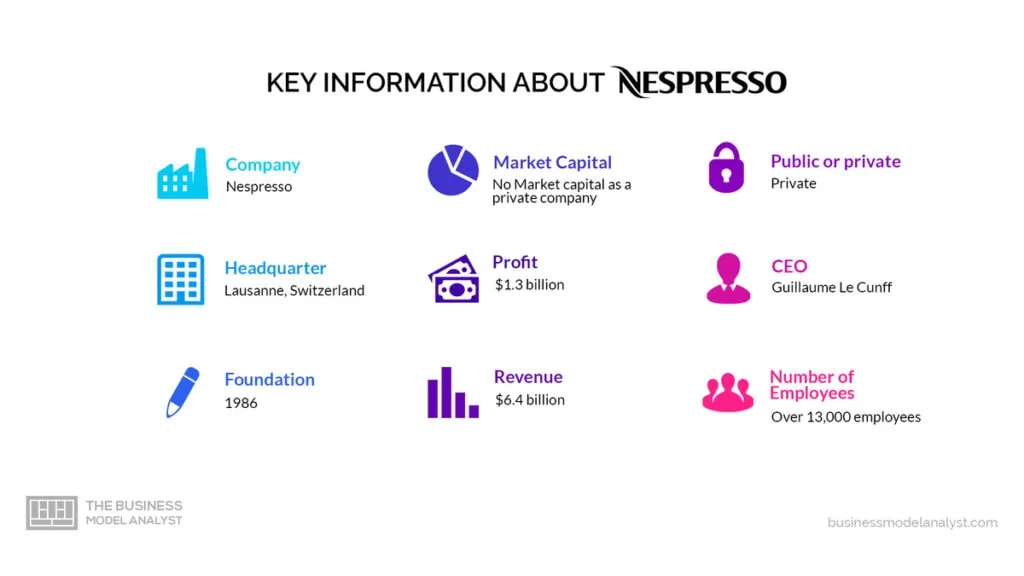
Contents
A brief history of Nespresso
The Nespresso brand was officially launched in the year 1986. The event that triggered the launch of Nespresso was the development of the single-serve coffee capsule by Eric Favre, a Nestlé employee, in the early 1970s. Favre’s invention aimed to create a convenient and consistent way to brew espresso-style coffee without the need for traditional espresso machines, which can be complex and time-consuming to operate.
However, despite Favre’s pioneering work on the coffee capsule, Nestlé initially did not fully realize the potential of his invention. Only in the mid-1980s, after several years of development and refinement, Nestlé recognized the market opportunity and decided to launch the Nespresso brand. The concept of the single-serve coffee capsule was innovative and addressed several challenges traditional coffee brewing methods face.
The combination of the innovative coffee capsule, the convenience of the Nespresso machines, and the premium coffee experience appealed to consumers and helped Nespresso gain popularity in the market. The first Nespresso machine, the “C-100,” was launched in Switzerland. Initially, the system targeted businesses and high-end hotels, offering a range of coffee flavors in convenient capsules.
Throughout the 1990s, Nespresso expanded its focus to the consumer market, introducing a broader range of coffee machines and a wider variety of coffee capsules. The machines were designed to be stylish and user-friendly, appealing to a broader audience. The 2000s marked a significant period of global expansion for Nespresso. The brand entered various international markets and opened Nespresso boutiques in major cities around the world.
The company also established an online retail presence, making its products more accessible to customers worldwide. In the 2010s, Nespresso began to prioritize sustainability initiatives. They launched the “Ecolaboration” program, focusing on eco-friendly coffee sourcing and recycling of used coffee capsules. Nespresso also collaborated with coffee farmers to improve sustainability practices in coffee production.
Nespresso gained immense popularity among coffee enthusiasts and consumers who appreciated the convenience and consistency of the coffee-making process. The success of Nespresso also attracted competitors in the single-serve coffee market.
Nespresso’s marketing efforts were notably boosted by actor George Clooney, who became the face of the brand in a series of successful advertising campaigns. Today, Nespresso has successfully expanded its reach through strategic partnerships, co-branding initiatives, and collaborations with renowned chefs and baristas.
Who Owns Nespresso
Nespresso is a brand owned by Nestlé, a Swiss multinational food and beverage company. Nestlé acquired the Nespresso brand and its associated patents and technologies when it officially launched Nespresso in 1986. Since then, Nespresso has become one of Nestlé’s most successful and well-known brands.
Nespresso Mission Statement
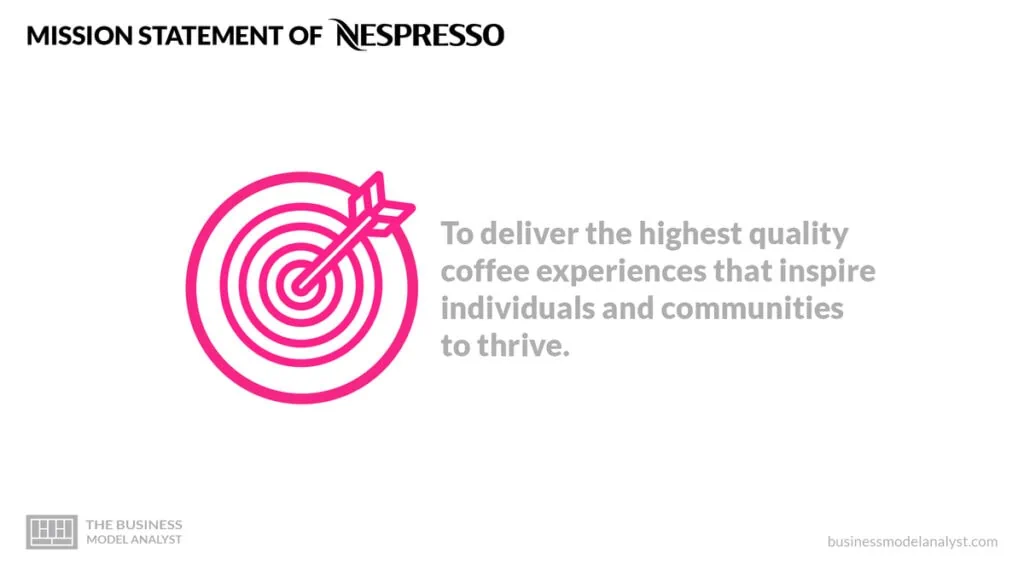
Nespresso’s mission statement is “to deliver the highest quality coffee experiences that inspire individuals and communities to thrive.”
How Nespresso works
Nespresso brand operates as a subsidiary of Nestlé, specializing in single-serve coffee machines and premium coffee capsules. Here’s how Nespresso works:
Coffee Sourcing
Nespresso carefully selects high-quality coffee beans from various regions across the globe. They establish long-term relationships with coffee farmers and cooperatives, focusing on sustainable farming practices and supporting fair trade principles. This approach ensures that Nespresso’s coffee beans are responsibly grown and harvested.
Coffee Capsules Production
Nespresso creates coffee capsules, also known as coffee pods, which are single-serve units containing pre-ground coffee. These capsules are designed to maintain the freshness and flavor of the coffee. Nespresso offers a wide variety of coffee blends and flavors, allowing customers to choose their preferred taste profiles.
Coffee Machines
Nespresso designs and manufactures coffee machines that are specifically designed to work with their coffee capsules. These machines are user-friendly and often feature programmable cup sizes, milk frothing options, and automated brewing processes. Nespresso’s machines are known for their convenience and ability to consistently deliver high-quality coffee.
Retail and E-commerce
Nespresso operates a global retail network, including Nespresso boutiques and stores, where customers can purchase coffee machines, coffee capsules, and accessories. Additionally, Nespresso sells its products through e-commerce platforms, making them easily accessible to customers worldwide.
Marketing and Branding
Nespresso invests in marketing and branding efforts to promote its products and establish itself as a premium coffee brand. They often collaborate with well-known personalities and celebrities in their advertising campaigns to reinforce their image as a luxurious and sophisticated coffee choice.
To use Nespresso’s service, you must purchase a Nespresso machine and register for the Nespresso Club (optional). Buy Nespresso coffee capsules, insert one into the machine, select your preferred coffee size, and brew the coffee.
How Nespresso makes money
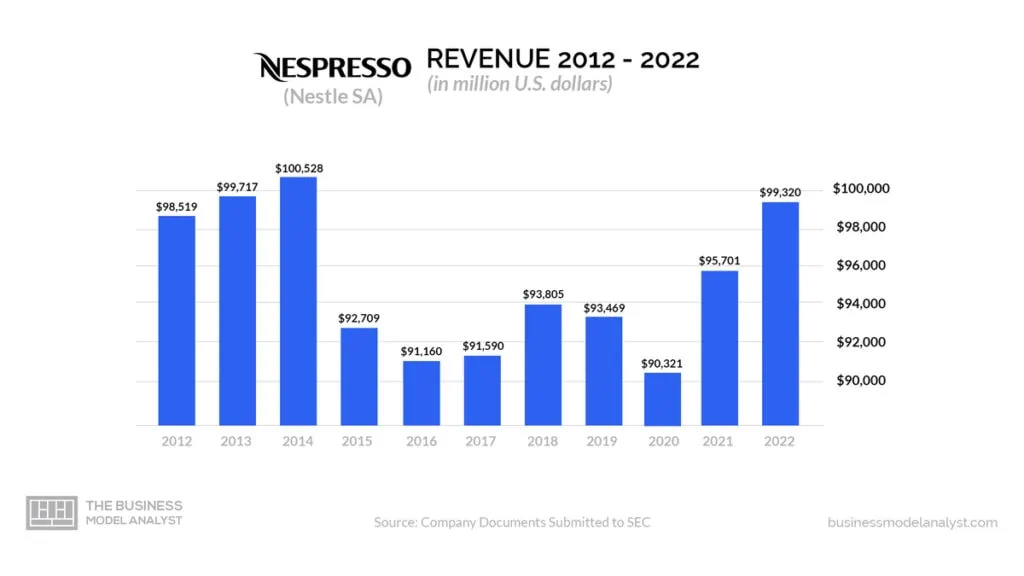
Here’s how Nespresso makes money:
Coffee Capsules Sales
Nespresso’s primary source of revenue comes from selling coffee capsules. These capsules are designed to work exclusively with Nespresso machines, creating a proprietary system. Nespresso offers a wide variety of coffee blends and flavors in these capsules, and they are sold at a premium price.
The exclusivity and high-quality coffee offerings give Nespresso a captive market, and the profit margins on each sale of coffee capsules significantly contribute to the company’s revenue.
Coffee Machine Sales
Nespresso’s coffee machines are another significant source of revenue. While the machines are sold at a relatively lower price than other premium coffee makers, they are essential for using the coffee capsules.
By offering a range of machines with various features and price points, Nespresso attracts customers to invest in their coffee machines. Once customers own a Nespresso machine, they are more likely to continue purchasing Nespresso coffee capsules regularly, generating ongoing revenue for the company.
Subscription Service
Nespresso offers a subscription service called “Nespresso Club.” Customers can sign up for the club and receive a regular delivery of coffee capsules based on their preferences. The subscription service ensures a steady stream of recurring revenue for Nespresso, as customers receive their favorite coffee blends without the need to make individual purchases.
Accessories Sales
Nespresso sells a variety of accessories that complement their coffee machines, such as milk frothers, water filters, and travel mugs. These accessories provide an additional source of revenue for the company, as customers often seek to enhance their coffee experience with these add-ons.
Licensing
Nespresso licenses its brand to other businesses, such as hotels, restaurants, and cafés. By doing so, Nespresso expands its market presence without directly selling its own products. These licensing agreements allow Nespresso to generate revenue through royalties or other negotiated fees from these establishments that use the Nespresso brand.
Nespresso Business Model
Let’s take a look at the Nespresso Business Model Canvas below:
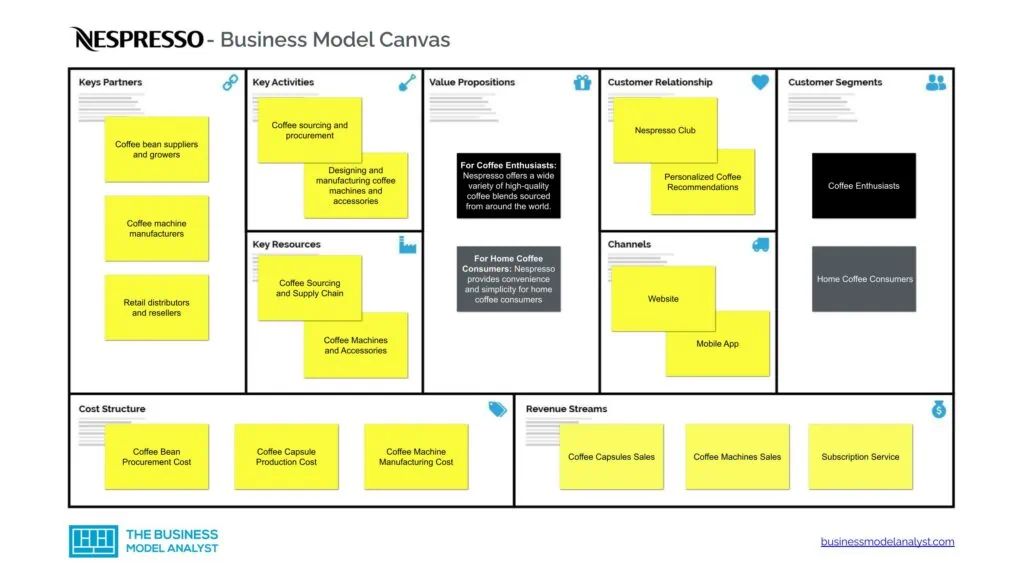
Nespresso Customer Segments
Nespresso’s customer segments consist of:
- Coffee Enthusiasts: Coffee enthusiasts are individuals who have a deep passion for coffee and are genuinely interested in its history, culture, and nuances. They appreciate the intricacies of coffee preparation and enjoy exploring the flavors and aromas of different coffee beans. Coffee is not merely a beverage to them; it’s a source of delight and a subject of fascination;
- Home Coffee Consumers: Home coffee consumers are people who find joy in preparing and enjoying coffee within the confines of their own living spaces. The experience of having coffee at home is meaningful to them and adds to their sense of coziness and familiarity;
- Busy Professionals: Busy professionals are individuals who lead fast-paced and demanding lives, often juggling multiple responsibilities and tasks. They rely on coffee as a reliable ally in their pursuit of productivity and efficiency;
- Hospitality Industry: The hospitality industry comprises people who work in various establishments catering to travelers and customers. For example, hotels, cafés, restaurants, and coffee shops are part of the hospitality industry;
- Gift Shoppers: Gift shoppers are individuals who take pleasure in selecting thoughtful presents for others.
Nespresso Value Propositions
Nespresso’s value propositions consist of:
- For Coffee Enthusiasts: Nespresso offers a wide variety of high-quality coffee blends sourced from around the world. Coffee enthusiasts can explore different flavors and intensities, ensuring a premium coffee experience at home. Nespresso’s machines are designed to extract the maximum flavor and aroma from each capsule, satisfying even the most discerning coffee lovers;
- For Home Coffee Consumers: Nespresso provides convenience and simplicity for home coffee consumers. Nespresso’s machines are user-friendly, making it easy to brew a delicious cup of coffee with just the touch of a button. The wide range of coffee options allows consumers to find their favorite blend without the need for complicated brewing techniques;
- For Busy Professionals: Nespresso recognizes the time constraints of busy professionals. Its machines offer quick brewing times, allowing professionals to enjoy a gourmet coffee without wasting precious minutes. The single-serve capsules eliminate the need for grinding coffee beans and cleaning up, making it an ideal solution for on-the-go professionals;
- For Hospitality Industry: Nespresso’s value proposition to the hospitality industry lies in its consistent and high-quality coffee offerings. By using Nespresso machines, hotels, restaurants, and cafés can efficiently serve premium coffee to their guests. The streamlined brewing process ensures that each cup maintains the same level of excellence, contributing to a positive customer experience;
- For Gift Shoppers: Nespresso’s sleek and modern design, along with its luxurious coffee offerings, makes it an attractive gift option. The brand’s gift sets and limited-edition collections cater to different tastes and occasions, making it an appealing choice for those looking to give a unique and sophisticated gift.
Nespresso Channels
Nespresso’s channels consist of:
- Website
- Mobile App
- Nespresso Boutiques
- Social media
- Direct mail
Nespresso Customer Relationships
Nespresso’s customer relationships consist of:
- Nespresso Club
- Personalized Coffee Recommendations
- Customer Support and Assistance
- After-Sales Service
- Customer Feedback and Surveys
- Social Media Engagement and Communication
Nespresso Revenue Streams
Nespresso’s revenue streams consist of:
- Coffee Capsules Sales
- Coffee Machines Sales
- Subscription Service
- Accessories Sales
- Licensing
Nespresso Key Resources
Nespresso’s key resources consist of:
- Coffee Sourcing and Supply Chain
- Coffee Machines and Accessories
- Production Facilities
- Nespresso Boutiques
- Online Platform
- Intellectual Property
Nespresso Key Activities
Nespresso’s key activities consist of:
- Coffee sourcing and procurement
- Designing and manufacturing coffee machines and accessories
- Production and packaging of coffee capsules
- Operating Nespresso Boutiques and retail channels
- Managing and maintaining the online platform and mobile app
- Implementing marketing and branding strategies
- Conducting research and development for product innovation
- Managing the Nespresso Club loyalty program
- Providing customer service and support
Nespresso Key Partners
Nespresso’s key partners consist of:
- Coffee bean suppliers and growers
- Coffee machine manufacturers
- Retail distributors and resellers
- Advertising and marketing agencies
- Technology partners
- Shipping and logistics companies
- Payment processing providers
Nespresso Cost Structure
Nespresso’s cost structure consists of:
- Coffee Bean Procurement Cost
- Coffee Capsule Production Cost
- Coffee Machine Manufacturing Cost
- Marketing and Advertising Cost
- Distribution and Logistics Cost
- Retail Operations Cost
- Research and Development Cost
- Customer Service and Support Cost
- Administrative and Overhead Cost
Nespresso Competitors
- Keurig: Keurig is a dominant player in the single-serve coffee market, particularly in North America. They offer a wide range of coffee machines that use K-Cup pods, which come in various flavors and coffee blends. Keurig’s machines are known for their ease of use and versatility, allowing users to brew coffee, tea, hot cocoa, and other beverages with just the press of a button. They have a broad selection of partner brands, offering consumers a diverse array of beverage choices. Keurig competes with Nespresso by appealing to a broader market, providing more options for different tastes and preferences;
- Starbucks: As a global coffeehouse chain, Starbucks competes with Nespresso through its Verismo system, which includes coffee machines and Verismo pods. Starbucks leverages its strong brand presence and loyal customer base to promote its premium single-origin coffee capsules. The company’s Verismo machines are designed to replicate the Starbucks café experience, allowing users to enjoy their favorite Starbucks beverages at home. By offering exclusive blends and promoting its commitment to ethical sourcing, Starbucks appeals to customers seeking the familiarity and quality associated with the Starbucks brand;
- Lavazza: Lavazza, an Italian coffee company with a long history, is known for its high-quality coffee blends and a wide range of coffee products. In the single-serve coffee market, Lavazza offers capsules that are compatible with their coffee machines. The company emphasizes its expertise in sourcing and blending coffee beans to create unique flavors and aromas. Lavazza competes with Nespresso by targeting coffee enthusiasts who appreciate authentic Italian coffee culture and a wide selection of coffee varieties from different regions;
- illy: Illy is another renowned Italian coffee brand that competes in the premium coffee segment. The company offers a range of espresso machines and iperEspresso capsules designed to create a distinctive espresso experience. Illy’s focus on sustainability and its dedication to producing consistent and high-quality coffee appeals to customers seeking a premium coffee experience at home. The company emphasizes the art of espresso-making and offers machines that can deliver barista-quality results with ease;
- Tassimo: Tassimo, owned by Mondelēz International, is known for its T-Disc system, which provides single-serve coffee, tea, hot chocolate, and other beverages. Tassimo machines use barcode technology to adjust brewing parameters based on the type of T-Disc used. This flexibility allows users to brew a variety of drinks with precise customization. Tassimo competes with Nespresso by offering a broader selection of beverages beyond coffee, catering to customers who enjoy versatility in their brewing options.
Nespresso SWOT Analysis
Below, there is a detailed SWOT analysis of Nespresso:
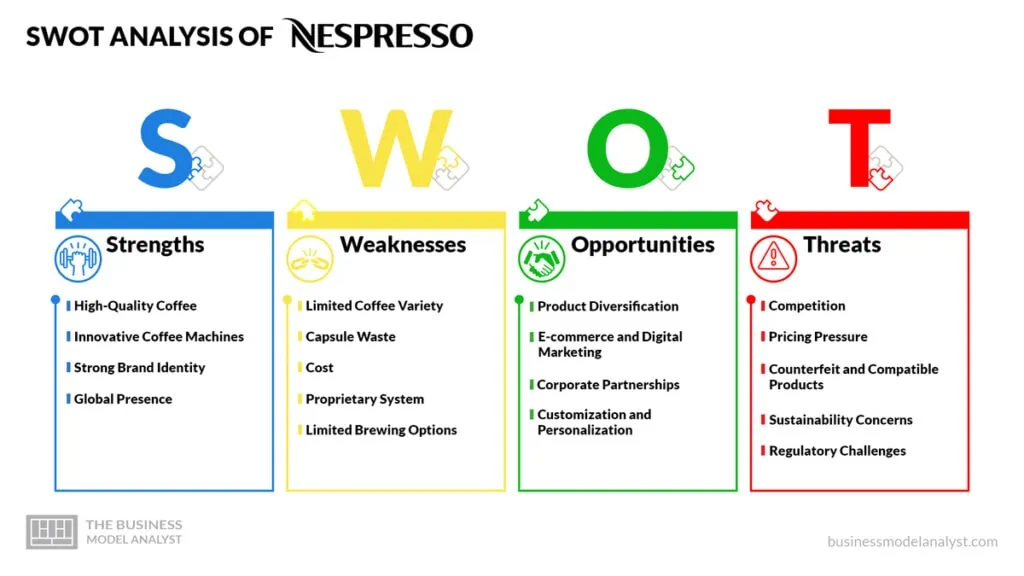
Nespresso Strengths
- High-Quality Coffee: Nespresso is renowned for providing premium, high-quality coffee from various regions worldwide. The brand offers a wide range of coffee flavors and intensities, catering to different tastes and preferences;
- Innovative Coffee Machines: Nespresso’s coffee machines are designed with cutting-edge technology that ensures consistent brewing and ease of use. The brand uses single-serve coffee pods, known as Nespresso capsules, which offer convenience and consistent coffee quality;
- Strong Brand Identity: Nespresso has established a solid and recognizable brand identity through its stylish and sleek design, premium branding, and captivating marketing campaigns. This has helped the brand stand out in a competitive market;
- Global Presence: Nespresso has expanded its presence in numerous countries, making its products readily available to a broad customer base. This global reach has contributed to its widespread popularity and market dominance;
Nespresso Weaknesses
- Limited Coffee Variety: Nespresso offers a wide range of coffee capsules, but compared to other coffee brewing methods, it has a more limited variety of coffee blends and flavors. Some coffee enthusiasts might prefer the flexibility of traditional coffee brewing methods or other coffee capsule systems that offer a broader selection;
- Capsule Waste: Nespresso’s single-use coffee capsules create environmental concerns due to the amount of waste generated. Although Nespresso has made efforts to address this issue by implementing recycling programs, some consumers might still be concerned about the environmental impact and prefer more eco-friendly coffee brewing alternatives;
- Cost: Nespresso machines and capsules are relatively expensive compared to traditional coffee makers. While the convenience and quality of Nespresso coffee are appreciated by many, the higher cost might deter price-conscious consumers;
- Proprietary System: Nespresso uses a proprietary coffee capsule system, meaning only Nespresso-branded capsules are compatible with their machines. This lack of compatibility with other coffee brands’ capsules could be seen as a limitation for consumers who prefer to have more choices and explore different coffee options;
- Limited Brewing Options: Nespresso machines are primarily designed for espresso-style coffee, which might not appeal to consumers who prefer other brewing methods like pour-over, French press, or drip coffee.
Nespresso Opportunities
- Product Diversification: The company can expand its product offerings beyond coffee machines and capsules, such as introducing complementary coffee-related accessories or other related beverages;
- E-commerce and Digital Marketing: As online shopping and digital marketing continue to grow, Nespresso can focus on strengthening its e-commerce platform and leveraging digital channels to reach a wider audience;
- Corporate Partnerships: Nespresso can explore strategic partnerships with other companies to expand its brand reach. Collaborations with luxury brands, hospitality chains, or airlines could create co-branded products and increase brand visibility;
- Customization and Personalization: Introducing greater customization in their products, such as personalized coffee blends or machine settings, could appeal to customers looking for unique and tailored experiences.
Nespresso Threats
- Competition: Nespresso operates in a highly competitive coffee market, facing rivals such as Keurig, Starbucks, and other premium coffee brands. Competitors might offer similar products, alternative brewing technologies, or aggressive marketing strategies that can challenge Nespresso’s market share;
- Pricing Pressure: Nespresso’s coffee capsules and machines have traditionally been more expensive than other coffee options. Price-sensitive consumers may be tempted to opt for more affordable coffee solutions, which could impact Nespresso’s sales and revenue;
- Counterfeit and Compatible Products: The popularity of Nespresso’s coffee machines and capsules might attract counterfeit products and third-party compatible capsules. These alternative products could negatively affect Nespresso’s brand reputation and potentially lead to revenue loss;
- Sustainability Concerns: With growing awareness of environmental issues, consumers increasingly seek eco-friendly products and practices. Nespresso’s single-use aluminum capsules, in particular, have faced criticism for their environmental impact. Failure to address sustainability concerns could drive environmentally-conscious consumers away from the brand;
- Regulatory Challenges: Changes in government regulations related to coffee packaging, waste disposal, or product safety standards could pose challenges for Nespresso’s operations and may require substantial adjustments to their business practices.
Conclusion
Nespresso’s successful adoption of the razor-razorblade business model has solidified its position as a prominent player in the competitive coffee industry. Through this model, Nespresso has effectively woven a lifestyle around its products, becoming synonymous with sophistication, quality, and a refined coffee experience.
The brand has successfully positioned itself as an aspirational choice for coffee enthusiasts who seek convenience and consistent taste, elevating the act of coffee consumption to an indulgent ritual. While the razor-razorblade model has been instrumental in Nespresso’s growth and success, the company must remain vigilant to potential challenges.
By staying vigilant to potential challenges, adapting to changing consumer preferences, and demonstrating a solid commitment to sustainability, Nespresso can continue to thrive in the face of increasing competition and evolving industry dynamics.

